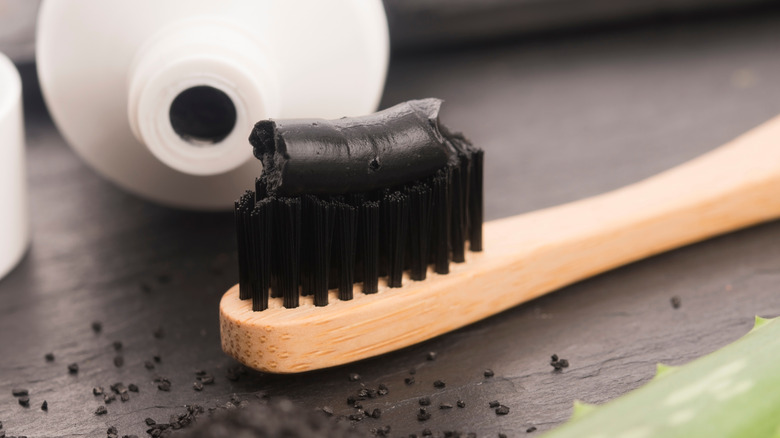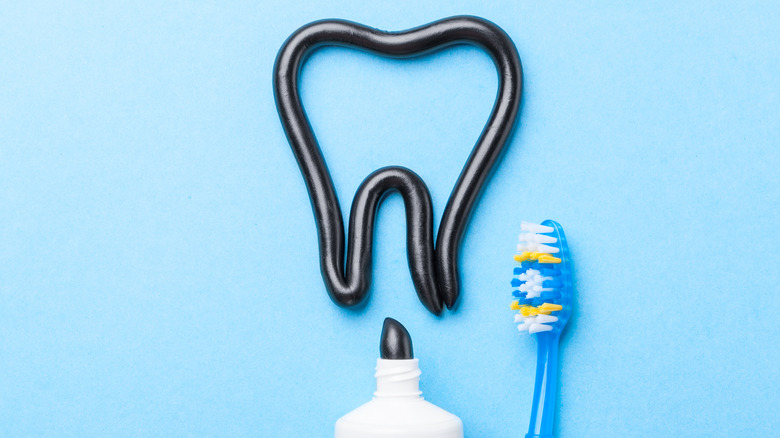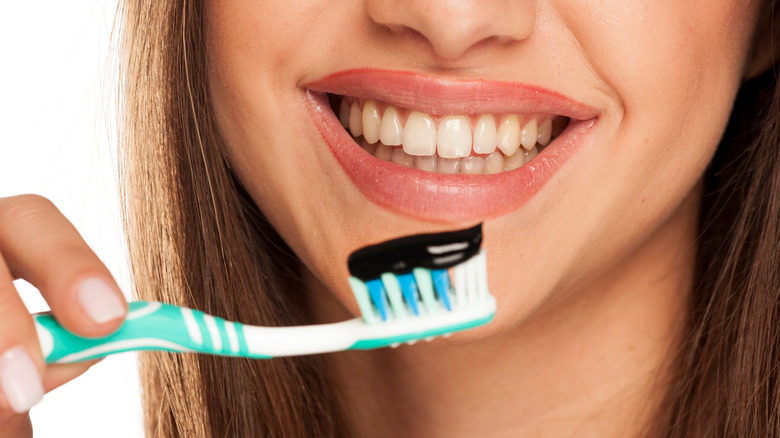Does Charcoal Toothpaste Actually Work?
Over the last few years, charcoal has quickly become a popular trend in healthcare and beauty, and has found its way into face masks, scrubs, diets — and even your toothpaste. People are raving how charcoal toothpaste not only whitens teeth, but it also makes your mouth fresh and breath smell better. Various brands have come out with their own versions, claiming that the product actually works.
This isn't just any charcoal though, so don't use what you might get in your stockings during the holidays. These products use a type of charcoal, activated charcoal, that is a fine grain powder made from wood, coconut shells, and other natural sources that are oxidized under extreme heat (via Healthline).
"Activated charcoal toothpastes are a rebirth of ancient medicine techniques," cosmetic dentist Peter Auster told Harpers Bazaar. "In theory, it binds to everything in its path — stains, tartar, bacteria, viruses, and maybe even your tonsils."
So activated charcoal toothpaste binds to what's on your teeth, but does it actually work to whiten your teeth — and is it safe?
Does charcoal toothpaste whiten teeth?
The toothpaste may remove surface stains since charcoal is mildly abrasive, but in order to fully whiten teeth, a product must work on stains on and below the enamel, Healthline notes.
According to Harpers Bazaar, removing stains from the surface (which are called extrinsic stains) is common with toothpaste that is designed to remove stains. However, whitening teeth includes going beyond surface stains to deeper stains (which are called intrinsic stains) that come from within the tooth, and these stains can only be removed from treatments that penetrate below the surface level.
"I recommend a charcoal toothpaste to remove surface stains but not to whiten teeth," cosmetic dentist Gregg Lituchy told Harpers Bazaar. "It is difficult to actually whiten a tooth with any toothpaste, but those with charcoal do remove surface stains effectively."
The toothpaste may also be too abrasive to brush your teeth with every day, Healthline says, as it can ultimately can wear your enamel down and later lead to greater exposure to stains — which can result in yellow teeth.
Is charcoal toothpaste safe to use?
There hasn't been enough research done on activated charcoal to confirm whether or not it is safe for oral use. It is important to know, though, that the American Dental Association has not approved charcoal toothpaste. An article published in the Journal of the American Dental Association last year concluded there isn't enough clinical and laboratory data that establishes the safety of charcoal toothpaste (via the Huffington Post).
Cosmetic dentist Timothy Chase recommended instead of charcoal toothpaste, people should use non-whitening fluoride toothpaste, followed by white strips. According to Chase, peroxide-based whitening products have "been proven to work really well, to be relatively inexpensive and to be very safe. There's been long-term studies done with peroxide, and we know it's safe and we know that it works."
Charcoal toothpaste often does not contain fluoride, which researchers say helps keep tooth enamel strong and protects teeth from cavities and decay. According to Healthline, there is some evidence linking charcoal toothpaste to increased tooth decay as well as an increased risk of charcoal particles accumulating in cracks of older teeth. Ultimately, it seems charcoal toothpaste may be good for a short term brighter smile but has more negative effects for the longterm.


